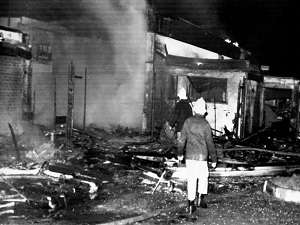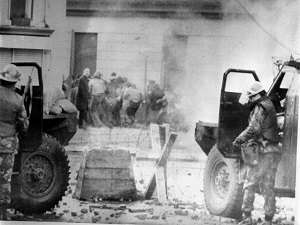
By David Young, PA
The number of regulatory checks currently required on goods arriving into Northern Ireland from Great Britain equates to 20% of the total undertaken by the entire EU, a Stormont official has said.
Denis McMahon, permanent secretary at the Department of Agriculture, Environment and Rural Affairs (Daera), said the Northern Ireland Protocol is requiring the region to carry out more documentary checks than any European member state.
Dr McMahon highlighted that the “huge” levels of bureaucracy are being witnessed during grace periods, when red tape necessitated by the protocol is limited.
Giving evidence to the Assembly’s Agriculture Committee, the senior official said his department is also seeking legal advice on a decision by Agriculture Minister Gordon Lyons to halt work on permanent checking facilities at Northern Ireland’s four main ports.
He said planned works, such as contractors moving equipment on to the proposed sites, have been “temporarily rescheduled” pending the outcome of the advice.

Dr McMahon made clear that the department will ultimately have to comply with the law in regard to the construction.
He also confirmed that an external legal challenge against the minister’s decision has been initiated.
The permanent border control posts are due to open in spring 2022, with ongoing checks taking place at temporary facilities in the ports.
Dr McMahon said food and plant safety checks currently only apply to 30% of the agri-food goods which will be potentially subject to the new processes when an exemption period for retail and supermarket goods expires.
He said 13,629 documentary checks were completed in January, with the weekly total rising steadily throughout the month.
“It is worth saying that the scale of documentary checks is huge by any standards,” he said.
“By way of illustration, our population is under half a percent of that across the European Union yet the documentary checks, according to the systems, completed so far would represent one fifth of the equivalent documentation right across the EU.”
He said that is because the protocol is affecting domestic food supply chains, whereas regulatory checks on EU imports are mainly bulk movements of international trade commodities.
Dr McMahon told committee members: “What is clear is that we’re handling a burden of work which is stretching us to the limit, which can only get less sustainable as we move beyond the grace period, again depending on what happens.”
The senior official said that of the shipments currently requiring documentary checks, 88% of them also undergo identity checks – requiring the back of the lorry to be opened up – and around 5% full physical inspections.
“There can be no doubt whatsoever that Daera staff are conducting very significant numbers of checks, including documentary, identity and physical checks and this within the context of the pandemic,” he said.
“The demand is huge and is reflected in the fact that we in Northern Ireland process documentation on a scale larger than all other entire countries across the European Union, according to the system.”
He added: “We’re achieving this ahead of a major change when the retail grace period ends, and there will be a huge increase in demand, building on current levels, which will not be sustainable with the staff and resources currently available to Daera.”
Dr McMahon questioned whether the department could even source the required number of vets and other professionals if it was to try.
“There will need to be some form of accommodation which can render the task doable, as well as the recognition that, as things stand, it’s not doable in its present form.”


 Police launch murder probe following ‘brutal and senseless’ death of woman
Police launch murder probe following ‘brutal and senseless’ death of woman
 More than 5,000 NI children set to spend Christmas in temporary accommodation
More than 5,000 NI children set to spend Christmas in temporary accommodation
 No evidence of police collusion in 1978 La Mon bombing
No evidence of police collusion in 1978 La Mon bombing
 Sex offender who targeted girls online across the UK jailed for 27 years
Sex offender who targeted girls online across the UK jailed for 27 years
 Pre-trial rulings due in Bloody Sunday prosecution of Soldier F
Pre-trial rulings due in Bloody Sunday prosecution of Soldier F